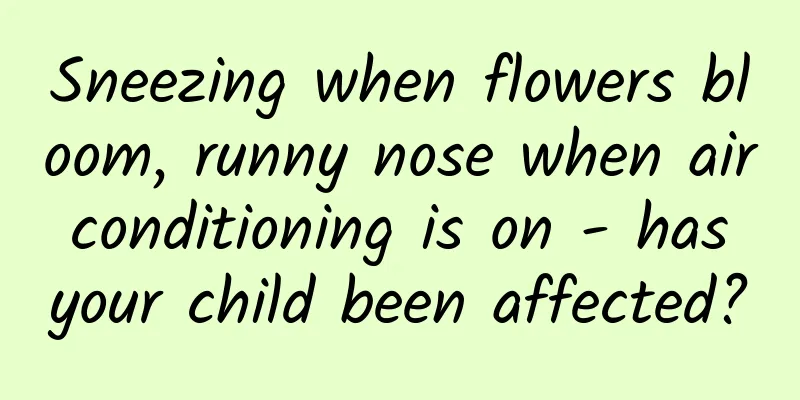Sneezing when flowers bloom, runny nose when air conditioning is on - has your child been affected?

|
Author: Ma Yu Children's Hospital Affiliated to Suzhou University Zhang Xinxing, deputy chief physician of Children's Hospital of Suzhou University Reviewer: Hao Chuangli, Chief Physician, Children's Hospital Affiliated to Soochow University Parent A: "Doctor, I took my child to the park to take photos yesterday. After we came back, he started rubbing his nose and eyes and sneezing like crazy. Is he allergic? But he doesn't have a rash on his body, and he didn't say he was itchy. What's going on?" Parent B: "Doctor, my child is acting strange. I just turned on the air conditioner and she started sneezing and having a runny nose. Is she catching a cold?" Parent C: "Doctor, my baby is always coughing, but he doesn't have a fever. He doesn't cough during the day, but he coughs when he lies down at night. His sleep quality is not good, and he has dark circles under his eyes. He has taken a lot of cough medicine but it doesn't get better. What should I do?" Parent D: "Doctor, I have rhinitis. Does my child have it too? Many of my friends' children have rhinitis. Should I give him medication to prevent it in advance?" Doctor: "According to the symptoms provided above, your child is considered to have 'allergic rhinitis'. You need to complete the allergen test and take treatment according to the child's condition!" Has your baby suffered from the above situation? Recently, in children's hospitals, whether in the respiratory specialist clinic or the general clinic, there is a group of parents who are troubled by their children's "repeated coughing" and "nasal congestion and runny nose" and bring their children to see a doctor. The culprit is actually "allergic rhinitis". 1. What is allergic rhinitis? Allergic rhinitis (AR), also known as allergic rhinitis, is a non-infectious chronic inflammatory disease of the nasal mucosa mediated mainly by immunoglobulin E (IgE) after atopic individuals are exposed to allergens (allergens). In short, it is nasal inflammation caused by stimulation from allergic substances. Figure 1 Copyright image, no permission to reprint 2. What are the symptoms of allergic rhinitis? Nasal congestion: more common. Runny nose: In young children, symptoms include repeated sniffing, coughing, and throat clearing. Itchy nose: Frequent rubbing of the nose, similar to the "salute" action. Sneezing: Several times a day, often more than 3 times each time, occurring in the morning, at night, or after contact with allergens. Other symptoms: nose bleeding, itchy eyes, red eyes, decreased appetite, feeding difficulties, sleep breathing disorders, lack of attention, hyperactivity and decreased motor ability, etc. Figure 2 Copyright image, no permission to reprint 3. What are the facial features of children with allergic rhinitis? Dark circles: In young children, blue-black circles may be seen on the eyelids. Allergic wrinkles: crescent-shaped wrinkles on the skin of the lower eyelids and horizontal wrinkles on the surface of the skin on the nose. Friction marks on lips: lesions in the conical area between the tip of the nose and the upper lip. Figure 3 Copyright image, no permission to reprint 4. How to determine whether it is allergic rhinitis? Based on the above symptoms and characteristics, and with any positive result in the allergen test, it can be diagnosed. The allergens that cause allergic rhinitis are mainly inhaled allergens. Allergic rhinitis needs to be diagnosed by a clinical physician after medical treatment and differentiated from diseases with similar symptoms, such as the common cold, sinusitis, nasal foreign bodies, adenoids hypertrophy, tic disorders, etc. Figure 4 Copyright image, no permission to reprint 5. Is allergic rhinitis serious? Studies have shown that allergic rhinitis may be combined with asthma, allergic conjunctivitis, chronic sinusitis, upper airway cough syndrome, atopic dermatitis, adenoids hypertrophy, secretory otitis media and sleep apnea. Therefore, controlling allergic rhinitis is crucial to improving or avoiding the occurrence of accompanying diseases. 6. Does allergic rhinitis require treatment? Allergic rhinitis affects the quality of life of children and may be accompanied by multiple diseases and require treatment. Figure 5 Copyright image, no permission to reprint (1) Environmental control - avoid or reduce contact with allergens and various irritants. Clean the air conditioner and filter regularly, and it is best to use a mite-removing vacuum cleaner. Change bedding frequently and wash in hot water above 55℃. Use less carpets and fewer stuffed toys. Avoid contact with weeds and pollen. Avoid contact with pets. The temperature of the air conditioner should not be too different from the outside temperature, and pay attention to ventilation. If food allergens cause obvious allergic symptoms in children, allergenic foods must be strictly avoided. (2) Medication and immunotherapy - Medication should be used under the guidance of a doctor. Nasal glucocorticoids, antihistamines, anti-leukotrienes, nasal saline irrigation, mast cell membrane stabilizers, decongestants, Chinese medicine, anti-IgE and other drug treatments; allergen-specific immunotherapy is currently the only causal treatment method that is expected to achieve a radical cure for allergic rhinitis. Desensitization treatments such as subcutaneous and sublingual immunotherapy can be considered for children with moderate to severe allergic rhinitis and those with clear allergens. In short, allergic rhinitis is a common chronic allergic disease, and it can achieve better results with standardized diagnosis and treatment. If your child has the above symptoms, please go to the hospital for treatment as soon as possible! |
<<: comScore: Survey shows 47% of smartphone users have purchased digital content
>>: GWI Social: Facebook still leads, other social media platforms are growing
Recommend
How long does it take for the black line on the pregnancy belly to disappear?
Many pregnant mothers have found that during preg...
Will body cold affect pregnancy?
Body cold is a problem that many women encounter ...
Women with cold uterus like to wear this thing
The characteristics of women with uterine cold re...
Standard belly picture of 18-week pregnant woman
At 18 weeks of pregnancy, the baby has already sp...
90% of cervical spondylosis does not require surgery. What should we pay attention to in conservative treatment?
Author: Zhang Zhihai, Chief Physician of Orthoped...
What is the difference between cheese and yogurt? What exactly is cheese?
In life, cheese and yogurt are both fermented fro...
It takes 17 days for ovulation to implant.
After ovulation, the sperm and egg combine and th...
What should I do if my period hasn't come for a week?
Due to the influence of food, clothing, housing a...
How is endometriosis diagnosed?
Endometriosis is a common gynecological disease, ...
Aspirin, clopidogrel and indobufen have similar effects, but what are the differences?
A friend left a message asking Huazi about the di...
What kind of back pain requires prompt medical attention? Is sitting properly relative to the spine important?
Author: Zou Haibo, Chief Physician of China-Japan...
New perspectives on early detection and diagnosis of lung cancer: the potential and challenges of biomarker screening
Lung cancer, as one of the most common malignant ...
Women sleep hot and cold at night
Why do women feel hot and cold when they sleep? W...
Women, don't be shy, five symptoms of private parts indicate "big trouble"
A woman's private parts are not always peacef...
How to divide the cup size of breasts_How to divide the cup size of girls' breasts
After puberty, women's breasts will gradually...









